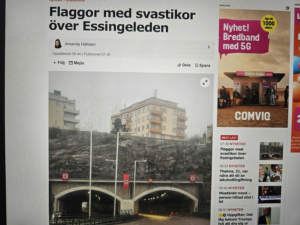El Salto editorial team – 7 October 2021
De los neocón a los neonazis (From Neocons to Neo-Nazis), the collective volume edited by Miquel Ramos and Nora Rodríguez, was launched yesterday with a presentation that turned into a ceremony to celebrate the union of the publications El Salto and La Marea, in their converging paths to unmask the Spanish far right.
“A literal kilo” of information on the far right in Spain. This is how Amelia Martínez-Lobo of the Rosa-Luxemburg-Stiftung presented the book De los neocón a los neonazis, edited by Miquel Ramos, journalist and collaborator with El Salto and La Marea,and the lawyer Nora Rodríguez. The book was launched in a crowded Ecoo, which was scaled down due to the pandemic restrictions.
This dossier, which comprises a meticulous mapping of the Spanish far-right beyond its current political arm, served yesterday afternoon as a symbol of unity between El Salto and La Marea, two outlets that have joined forces to offer a joint subscription deal at a reduced rate, accompanied by this book, which is not being sold in stores.
At the event, which included speeches by the two editors of the book and from Ter García, co-founder of El Salto, and Antonio Maestre, deputy director of lamarea.com, the speakers tried to break down the reasons why antifascist journalism is so important, as well as outlining some possible strategies for putting an end to fake news and overcoming the cultural war that has been instigated by Vox.
Ramos, who has been denouncing the actions of neofascist groups in Spain for more than a decade – long before the arrival of Vox – recalled the loneliness he felt during his first years in the job when he had to write under a pseudonym “because he was afraid of the far-right”, and celebrated the fact that today he could count on a public sphere to present a book like this one. At the same time, journalist Antonio Maestre pointed out that he is currently facing four criminal charges for alleged hate crimes brought by figures from the far right.
In this battle for the narrative, the speeches revolved around the responsibility of the media not to accept or disseminate discourse that goes against human rights. They also analyzed the possible ways of closing the door on a discourse that has taken hold of a significant sector of the working class. “The narrative of the far-right is very powerful because it is very simple and is transmitted in a direct way. Our message is more difficult to get across because it is more complex,” Ter García explained.
In addition, Ramos recounted the ins and outs of some of the information he has put together over the years, admitting that some of it is based on leaks from members of the police about their own colleagues, in order to dismantle the extensive branches of the far-right within this institution. He has also received information about the armed forces, for which he relied on the testimony of a member of the military who preferred to testify on camera with his face concealed. The journalist posed the question: “What kind of democracy is this in which a military man who is a democrat has to conceal his face to denounce a neo-Nazi cell within the army?”
Against hate crimes
Regarding the legislation and possible improvements in our penal code to punish hate crimes, the lawyer Nora Rodríguez reminded us that we have one of the toughest penal codes in Europe. The problem, according to Rodríguez, is that the laws are not enforced, and when the public prosecutor’s office acts on its own initiative, most of the time the cases come to nothing.
“We don’t need to make the laws against hate crimes tougher, what we need to do is to start enforcing them,” Rodríguez said, adding that the courts usually end up acquitting neo-Nazi groups and that fascist attacks have increased by 300%.
In fact, what was left unanswered was a possible solution to the current judicial situation in Spain, where a “necessary” overhaul of the judiciary, which is markedly conservative, has come to a standstill. “When I am presented with a lawsuit, I have to trust that it won’t end up in a conservative court. So far, I have been lucky, but I could go to jail if it lands in the wrong court,” Maestre explained.
The event ended with a round of discussions that closed on a positive note, concluding that though the far right has made its way into congress, the battle being waged by social organizations and media outlets such as El Salto or La Marea is more necessary than ever and that supporting these activities ought to be a top priority.







